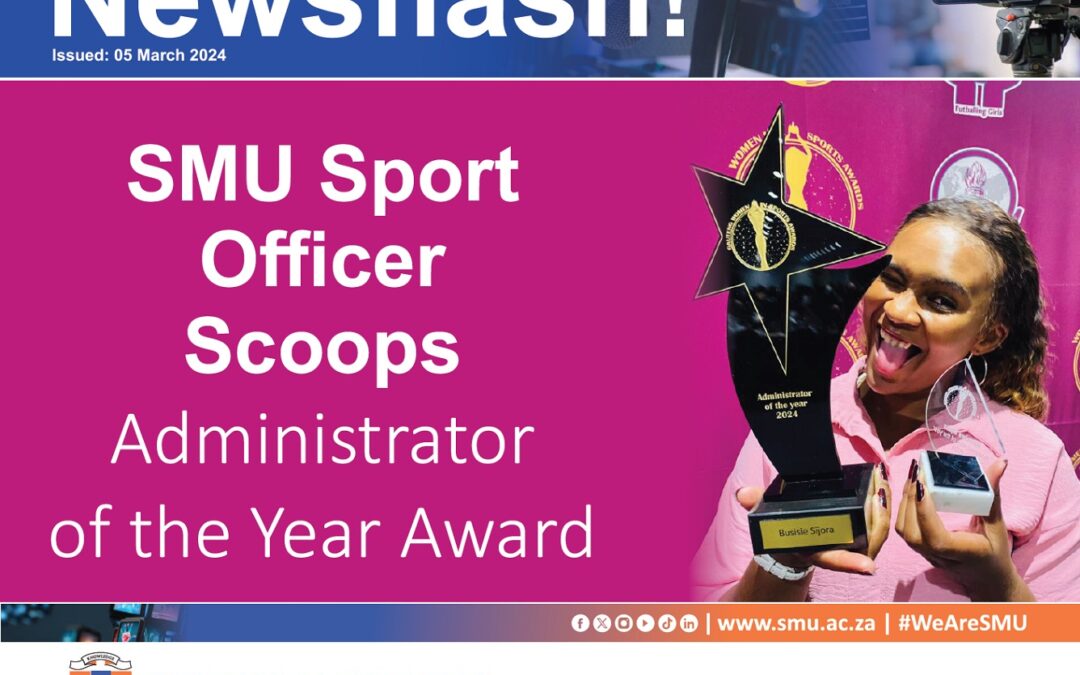
by Lorato | Mar 5, 2024 | Accolades and Achievements, All News, SMU Media, Student Media
SMU Sports Officer, Ms Busisiwe Sijora scooped the Administrator of the Year award during the Gauteng Women in Sport Awards 2024, held in Kyalami, Midrand, on Saturday, 2 March 2024. The award is bestowed on individuals who have significantly advanced opportunities for women in sports, demonstrated excellence in their administrative roles, fostered inclusivity, contributed to capacity building, engaged in self-development and promoted excellence in sports management.
Being a finalist amongst esteemed sports administrators in the province was a testament to the calibre of competition and the rigorous standards set by the award criteria. Winning this award undoubtedly opens doors for Busisiwe to further her career, providing opportunities to engage in more significant initiatives, expand networks and to inspire others in the field of sports administration. “Winning the Administrator of the Year award was an unexpected honour amidst fierce competition. It reaffirmed the significance of persistent dedication and unwavering commitment to sports administration. This recognition not only validates the demanding work invested but also serves as a motivation to continue pushing boundaries and making impactful contributions to the sports community,” said Busisiwe.
As an administrator, her approach to performing duties diligently is founded on two key principles, namely, effective planning, and continuous personal development. “Firstly, I precisely organise tasks through a detailed to-do list, breaking them down into manageable segments on a monthly, weekly, and daily basis. This structured approach ensures that I stay on track and effectively manage my workload. Secondly, I prioritise communication with student-athletes, actively engaging with them to understand their challenges, aspirations, and feedback. By listening attentively, I can tailor administrative approaches to better meet their needs and foster a supportive environment,” shares Busisiwe.
Ms. Sijora recognises the importance of personal development in staying abreast of industry trends and best practices. To this end, she regularly participates in short courses and seeks opportunities to network with senior administrators. Additionally, she draws insights from Europe-based content on sports management, recognising that she can learn valuable lessons from institutions that are ahead of us in this field. “Furthermore, I actively seek guidance from mentors and engage with other professionals in senior sports positions at different spaces in the sports industry. This allows me to gain valuable insights into effective administrative practices and refine my approach accordingly. By continuously learning and adapting, I ensure that I am equipped to effectively meet the demands of sports administration and contribute positively to the field,” she said.
Her plans for the Sports Officer portfolio at the SMU Sports and Recreation Department involve implementing initiatives to enhance inclusivity and diversity within sports programmes, ensuring equitable opportunities for all; strengthening partnerships with external organisations to provide additional resources and opportunities for sports development; to enhance administrative efficiency through the implementation of innovative technologies and streamlined processes; continuously advocate for the advancement of women in sports through targeted initiatives and awareness campaigns; Foster a culture of excellence and sportsmanship within the university’s community through various engagement activities and events; Putting SMU Sport and Recreation out there in terms of sharing our stories.
“Additionally, I feel there is a strong need to develop and expand mentorship programmes to nurture leadership skills and personal development among student-athletes. These kinds of programmes would aim to provide guidance, support, and opportunities for growth, empowering students to reach their full potential both on and off the field.”
In addition to her role as a Sports Officer at the SMU Sports and Recreation Department, she is actively engaged in the following leadership positions within the sports community: Vice Chairperson – USSA Football, Secretary – USSA Handball, and EXCO Member – South African Handball Federation. “Two years ago, I started an initiative to support sports graduates by creating a WhatsApp group dedicated to sharing sports-related job opportunities every week. This platform has served as a valuable resource for aspiring professionals, providing them with access to career opportunities and networking connections within the sports industry. I am proud to say that this initiative has not only opened doors for numerous sports graduates but has also brought hope and encouragement to many individuals pursuing their passion in sports administration and management,” she recalls.
Busisiwe is a multi-award-winning administrator, boosting an award-laden cabinet that encompasses a ten-year awards haul:
- 2024 Administrator of the Year – Gauteng Women in Sports Awards – Provincial
- 2023 Champion of Service – SMU Student Affairs Excellence Awards
- 2023 Full Colours – SMU Student Affairs Excellence Awards
- 2023 Administrator of the Year – Gauteng Women in Sports Awards – Tshwane
- 2022 Administrator of the Year – Gauteng Women in Sports Awards – Tshwane
- 2017 Administrator of the Year – TUT Sports Awards
- 2017 International Participation – TUT Sports Awards
- 2014 Best Student Administrator of the Year – TUT Sports Awards
Through her multifaceted involvement in sports leadership roles and initiatives, she is deeply committed to driving positive change and fostering growth within the sports community. She believes that collaboration, innovation, and mentorship are essential components for advancing the field of sports administration and creating impactful opportunities for all individuals involved.
Newsflash - SMU Sport Officer Scoops Administrator of the Year Award
File size: 1.55 MB
Created: 05-03-2024
Updated: 05-03-2024
Hits: 159
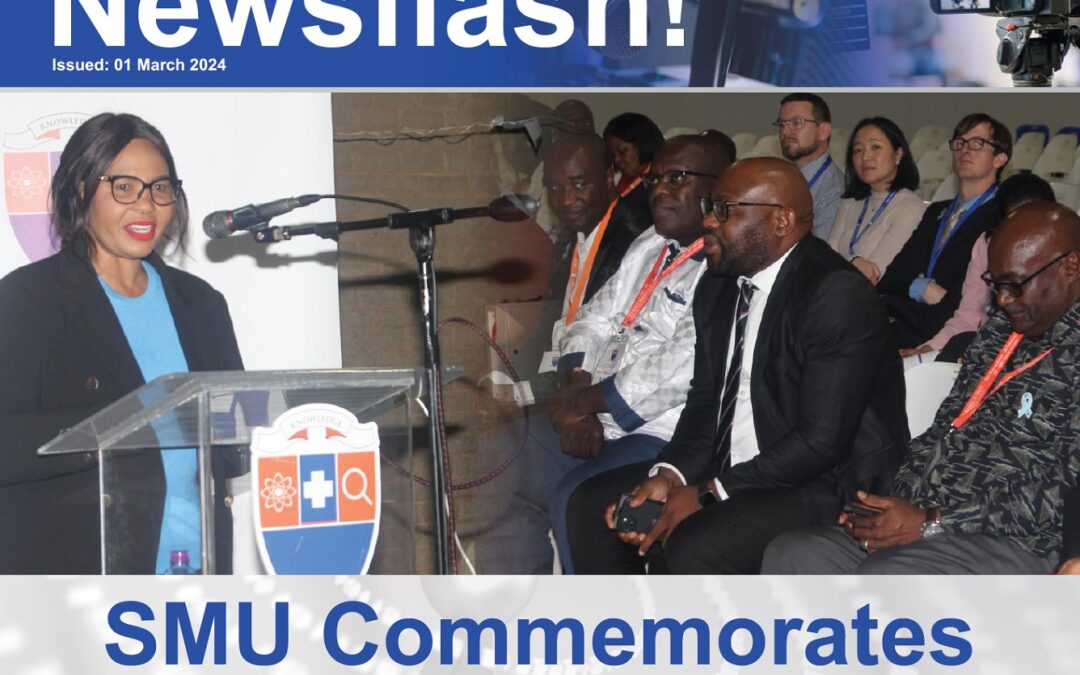
by Lorato | Mar 1, 2024 | Accolades and Achievements, All News, SMU Media, Student Media
Sefako Makgatho Health Sciences University (SMU) and the Rare Advocacy Movement (RAM) in partnership with Rare360 observed Rare Disease Day (RDD) on the 29th of February 2024 under the theme ‘developing a global rare disease centre of excellence’. The day was commemorated to raise awareness about rare diseases and improve access to treatment and medical representation for individuals living with unusual diseases.
A rare disease is a medical condition that affects a small number of people compared to the general population. Types of rare diseases include Gaucher disease caused by enzyme deficiency that leads to the storage of complex lipids in certain types of blood cells, Haemophilia a blood disorder that stops blood from clotting properly and Cystic fibrosis is a genetic (inherited) disease that causes sticky, thick mucus to build up in organs, including the lungs and the pancreas amongst others.
SMU’s Vice-Chancellor Prof Peter Mbati welcomed all esteemed guests at the event and indicated that this day was held in honour and celebration of the incredible strength and resilience of those who are affected by rare diseases. He informed the audience that the Health Equity Diagnostic Infrastructure (HEDI) Initiative hosted by the RAM will partner with the university to establish a medical infrastructure as a global rare disease centre of excellence within SMU that will offer diagnostic and clinical services and support therapeutic research and development programmes. “My humble request to you is to help champion this course and for the Department of Health to work closely with us in the establishment of this global rare disease centre of excellence,” said Prof Mbati.
Gauteng MEC for Health and Wellness Nomantu Nkomo-Ralehoko said in her address that, it was an honour to stand before the audience on this occasion of Rare Disease Day. She explained that this day serves as an important reminder of the ongoing struggles faced in our country by individuals with these diseases and the importance of collective action taken in addressing these challenges. “In South Africa, many individuals with rare diseases face not only health challenges but also social and economic barriers. It is our duty as a community to ensure that no one is left behind in our pursuit of health equity. I would also like to extend my gratitude to the university and its leadership for hosting and organizing this event,” shares the MEC.
Founder and Chief Executive Office of Rare Disease South Africa Kelly du Plessis stressed issues around the Rare Disease Ecosystem. She showed that the ecosystem of rare diseases is overlooked within the borders of South Africa. She explained that numerous rare diseases silently affect lives by challenging individuals and families in ways that many of us cannot fully comprehend. “The ecosystem of rare diseases encompasses not only the patients, but also the healthcare providers, researchers, policymakers and carriers, and caregivers that navigate the intricate landscape of diagnosis, treatment, and support on a day-to-day basis. It is crucial that we recognize the importance of collaborative efforts by fostering a network of medical professionals, researchers, and advocates,” said Du Plessis.
Master of Science in Biochemistry student Siphesihle Mkhwanazi said his highlight of the event was meeting the exhibitors. He mentioned that he was able to exchange contacts and foster relationships for future collaborations, which could lead to publishing together with one of the exhibitors.
About 72% of rare diseases are estimated to have a genetic component. Starting in childhood: Around two-thirds of people living with a rare disease are children. Having a broad range of symptoms: Symptoms can vary greatly from disease to disease, and even from person to person with the same disease. Being difficult to diagnose.
In addressing the initiatives to prioritise the needs of rare disease patients and their families, RDD brought together a vibrant confluence of partners including advocacy groups, academia, industry professionals and allies, as well as regulatory authorities, public policy professionals, and political leaders. All of whom supported the rare disease community by advocating for improved access to treatment and allied services, as well as by engaging in activities that discuss novel solutions, the latest clinical cases and the future of rare disease therapeutics.
Newsflash - SMU Commemorates Rare Disease Day
File size: 1.58 MB
Created: 01-03-2024
Updated: 01-03-2024
Hits: 154
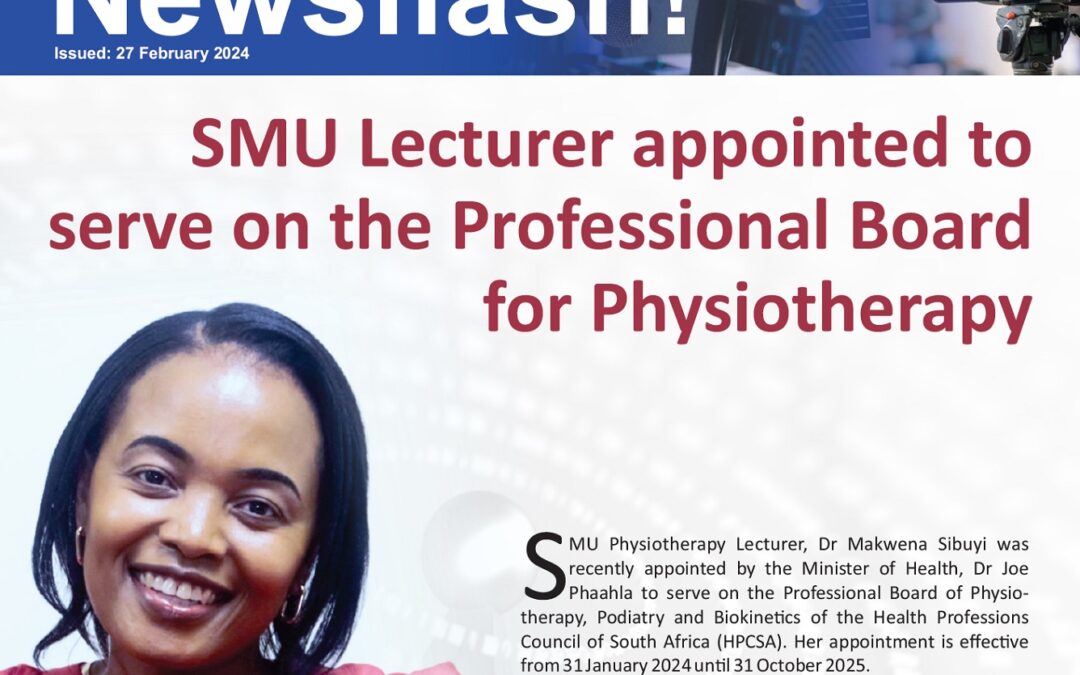
by Lorato | Feb 27, 2024 | Accolades and Achievements, All News, SMU Media, Student Media
SMU Physiotherapy Lecturer, Dr Makwena Sibuyi was recently appointed by the Minister of Health, Dr Joe Phaahla to serve on the Professional Board of Physiotherapy, Podiatry and Biokinetics of the Health Professions Council of South Africa (HPCSA). Her appointment is effective from 31 January 2024 until 31 October 2025.
Her appointment as a board member is informed by Regulations Relating to the Constitution of the Professional Board of Physiotherapy, Podiatry, and Biokinetics published on Government Notice R1246 in the Government Gazette 31633 of 28 November 2008. “The professional board requires a composite of five physiotherapists of which the majority should be coming from a group of people that were previously disadvantaged, such as women. The process entailed being nominated by physiotherapists whose names appeared in the registers of physiotherapists and have a valid postal address in the Republic of South Africa,” explains Dr Sibuyi.
She holds a Bachelor of Science in Physiotherapy (WITS), Master of Science in Physiotherapy (WITS) and Doctor of Philosophy in Physiotherapy from the University of Pretoria. She is currently pursuing a Postgraduate Diploma in Health Science Education at WITS. She is a School of Health Care Sciences’ Teaching and Learning Committee member. In addition, she is a scientific committee member of the 7th Annual Africa Interprofessional Health Conference 2024.
Her responsibilities as a board member are not only confined to her physiotherapy profession, but expand to other health professions such as podiatry and biokinetics. “My responsibilities are rooted in the Regulations relating to the functions and functioning of the Professional Board [Regulation No2]. I will be serving within the various established committees (Education, Training and Registration Committee, Committee of Preliminary Enquiries, Practice Committee, Biokinetics Internship Committee, and the Executive Committee) to guide the health professionals and to protect the public,” she further stated.
As a lecturer, her responsibilities entail being a fourth-year course coordinator; teaching paediatric physiotherapy modules for all year levels (from first to fourth year), reviewing the paediatric curriculum; supervising students at clinical sites; supervising undergraduate and postgraduate research; participating in community engagement activities and conducting research. She gives details on how her appointment will affect Physiotherapy offerings at SMU. “The knowledge and experience that I will acquire from the Professional Board will influence operations and inspire change at the level of the SMU Physiotherapy Department. Particularly with academic challenges relating to the education and training of physiotherapy students, curriculum reviews and reinforcing guidelines for student-staff ratio.”
Given the platform as a board member, there are key issues that affect the Physiotherapy profession that she believes need to be addressed urgently. She alluded that the key challenge is the distribution of physiotherapists in the public sector. Further stating that “There is a high proportion of physiotherapists serving in the Department of Health compared to those serving in the education sector. This imbalance is attributable to the increasing number of qualified physiotherapists not being retained post-community service year. Provincial Departments of Education, particularly, in rural provinces need to open more posts to ease off the pressure from health departments and appoint physiotherapists with similar benefits to those provided by the Department of Health.”
She hopes that her appointment is a positive move towards her growth at the HPCSA and Institutions of Higher Learning. She welcomes her appointment into the Professional Board and knows that she is just the person they were looking for.
Newsflash - SMU Lecturer appointed to serve on the Professional Board for Physiotherapy
File size: 1.82 MB
Created: 27-02-2024
Updated: 27-02-2024
Hits: 159
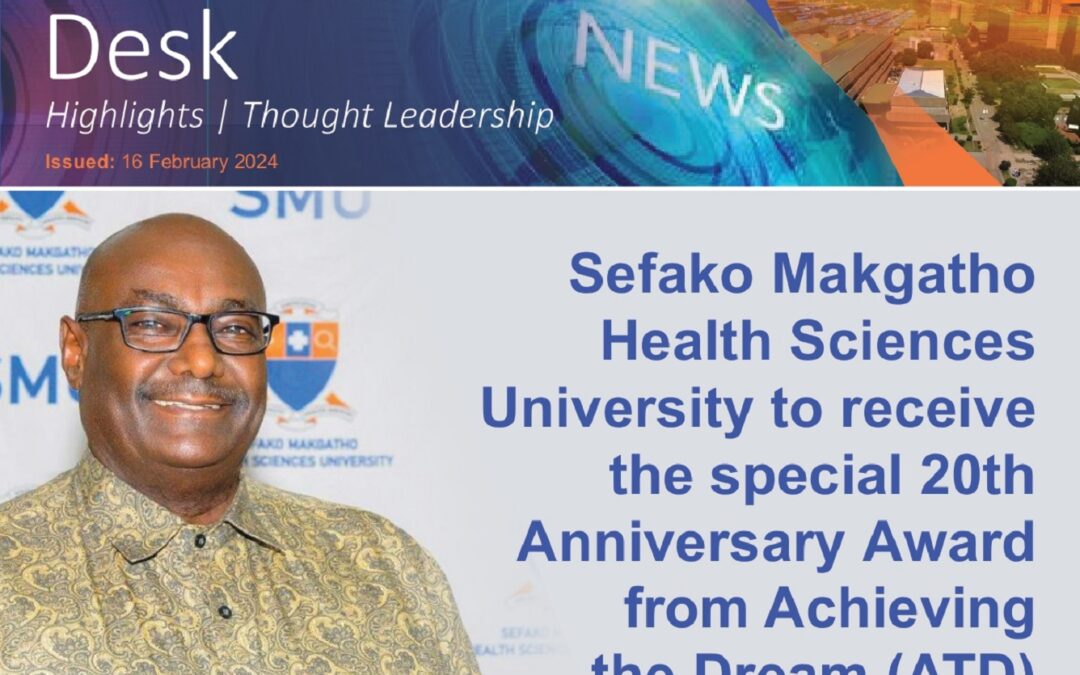
by Lorato | Feb 18, 2024 | Accolades and Achievements, All News, SMU Media, Student Media
Achieving the Dream (ATD) will present Sefako Makgatho Health Sciences University with a special 20th anniversary award at DREAM: the Siyaphumelela Network Award. This Award celebrates the work of ADTs South African partner institutions in advancing equity and driving student-centered transformation while enriching the work that is being done in the US with global insights. The Award ceremony is scheduled to take place on the 21 February 2024.
Siyaphumelela
Funded by the Kresge Foundation, Siyaphumelela, which is a network of South African universities committed to student success, was created in 2014 and has grown from five to 17 universities with increasing participation in ATD. ATD’s partnership with Siyaphumelela has unceasingly flourished over time; and Siyaphumelela has continued to send representatives to DREAM each year.
Achieving the Dream (ATD)
ADT is an organization that provides institutions with integrated, tailored support for every aspect of their work, from foundational capacities such as leadership, data and equity to intentional strategies aimed at providing holistic support to students. Drawing from its experts, ADT prides itself in building customized growth plans to address the unique challenges each institution faces. They choose transformation over tradition, curiosity over inaction, innovation over status quo.
In response to this acknowledgement, SMU Vice Chancellor, Prof. Peter Mbati stated that “This is award is further acknowledgement of the good work done at SMU”. As we celebrate this achievement, it is important for the university to use it as a stepping stone to further position SMU as a premier institution in the country, Prof Mbati concluded”.
VCs Desk - Sefako Makgatho Health Sciences University to receive the special 20th Anniversary Award from Achieving the Dream (ATD)
File size: 707.59 KB
Created: 18-02-2024
Updated: 18-02-2024
Hits: 134
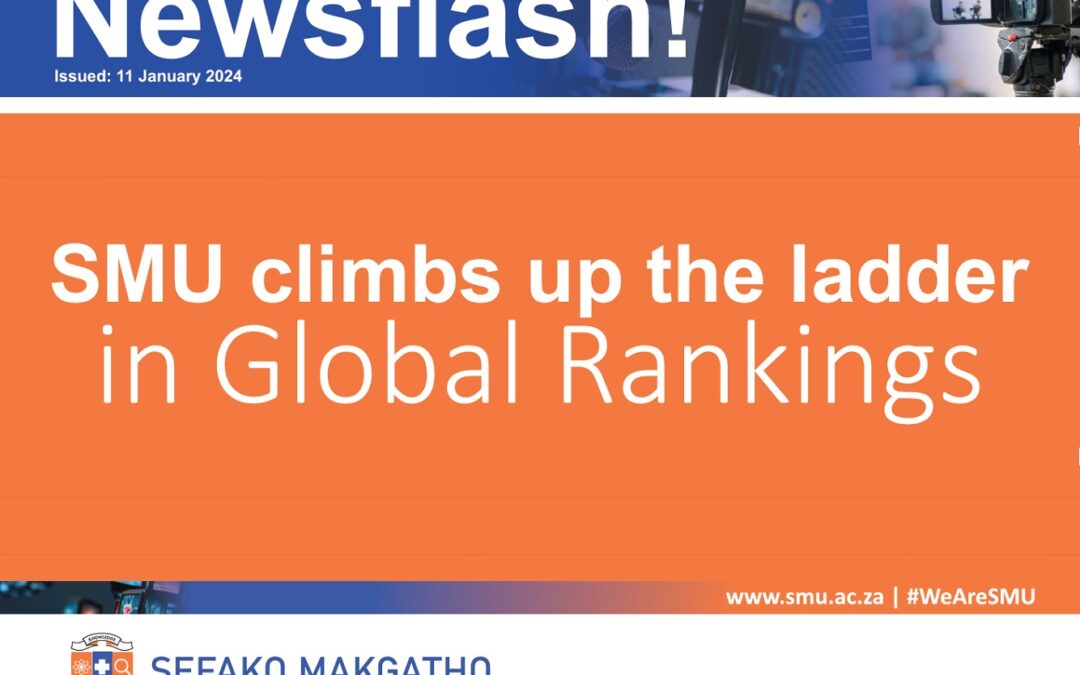
by Lorato | Jan 15, 2024 | Accolades and Achievements, All News, SMU Media, Student Media
About the University Ranking by Academic Performance (URAP)
The University Ranking by Academic Performance (URAP) is a global ranking system that assesses and ranks higher education institutions (HEIs) based on academic quality and performance. URAP aims to assist universities in identifying areas for improvement in specific academic performance indicators. The system is continuously evolving, with the rankings being regularly updated based on continuous research and feedback from different stakeholders.
Methodology
The Uni Ranking by Academic Performance (URAP) methodology involves the following key steps:
• Data Collection
URAP gathers data from Web of Science and InCites, focusing on higher education institutions (HEIs) with the highest number of publications. Initial consideration was given to 3,000 Higher Education Institutions (HEIs).
• Data Processing
After data collection, the information undergoes pre-processing and data-cleaning to ensure reliability. Statistical analysis is performed to address skewed distributions in the bibliometric data.
• Ranking Indicators
URAP uses six academic performance indicators to evaluate HEIs. These indicators include the following: article (current scientific productivity), citation (research impact), total document (scientific productivity), article impact total (research quality), citation impact total (research quality), and international collaboration (international acceptance).
• Scoring
The total score of 600 is distributed among the indicators based on a set of weighting scores assigned through the Delphi system. Each indicator receives a percentage of the total score, with weights assigned as follows: Article (21%), Total Document (10%), Citation (21%), Article Impact Total (18%), Citation Impact Total (15%), and International Collaboration (15%).
• Objective and Coverage
The indicators serve objectives such as measuring scientific productivity, research impact, research quality and international acceptance. The coverage of the data spans specific years, providing a snapshot of the academic performance during those periods.
• Expert Involvement
The Delphi system involves a group of experts who assign weighting scores to the indicators, contributing to the transparency and robustness of the ranking system.
SMUs performance
Sefako Makgatho Health Sciences University (SMU) has exhibited commendable progress in the URAP rankings, showcasing a notable improvement in the 2023/2024 academic year compared to the previous year. In the 2022/2023 rankings, SMU was ranked at number 19 in South Africa, with a global rank of 3041. However, in the subsequent academic year, 2023/2024, SMU has significantly advanced, securing the 16th position in South Africa, accompanied by a substantially improved global rank of 2229 and an overall score of 157.97.
In his remarks, Prof. Marvey, Director for Institutional Planning indicated that this noteworthy progress indicates SMU’s dedication to academic excellence and its successful efforts to enhance its standing globally.
Newsflash - SMU climbs up the ladder in Global Rankings
File size: 738.96 KB
Created: 15-01-2024
Updated: 15-01-2024
Hits: 231
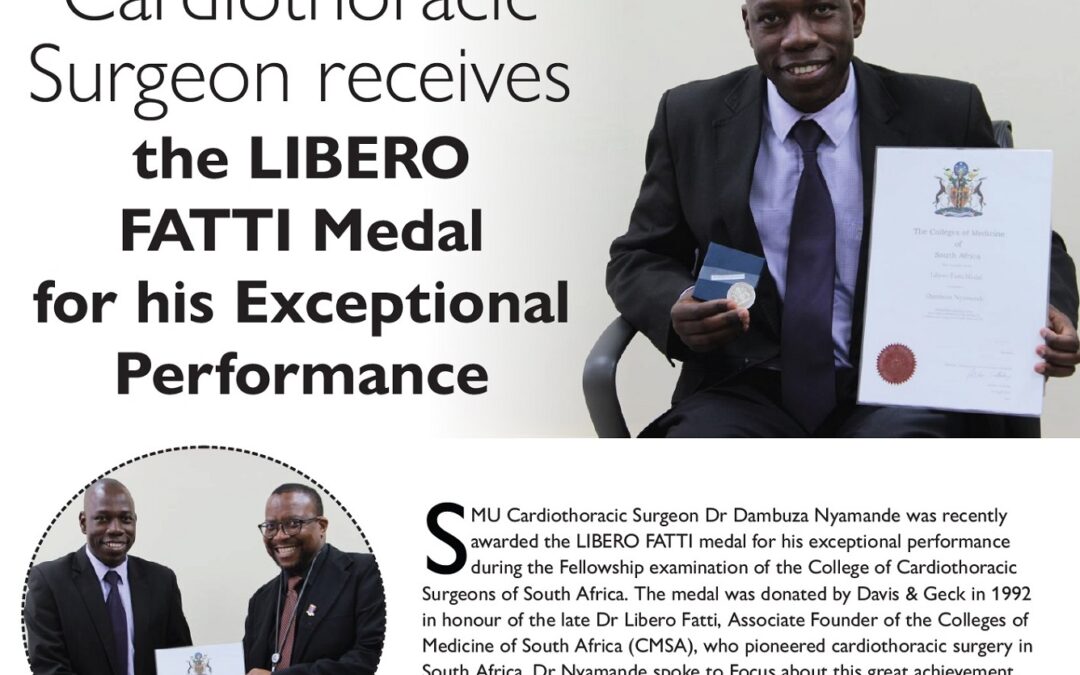
by Lorato | Nov 30, 2023 | Accolades and Achievements, All News, SMU Media, Student Media
SMU Cardiothoracic Surgeon Dr Dambuza Nyamande was recently awarded the LIBERO FATTI medal for his exceptional performance during the Fellowship examination of the College of Cardiothoracic Surgeons of South Africa. The medal was donated by Davis & Geck in 1992 in honour of the late Dr Libero Fatti, Associate Founder of the Colleges of Medicine of South Africa (CMSA), who pioneered cardiothoracic surgery in South Africa. Dr Nyamande spoke to Focus about this great achievement.






